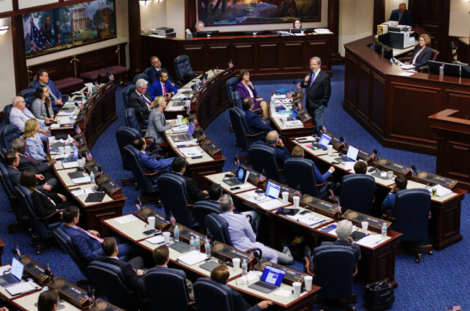By Peter Schorsch
FloridaPolitics.com
March 14, 2022
Today is the day the 2022 Legislative Session ends.

After spending most of Friday debating the record $112 billion budget, lawmakers expect to meet this afternoon to give it the final OK.
There are a handful of contentious issues lodged in the spending plan.
House Republicans tucked in language that will make a dozen school districts that instituted mask mandates ineligible to receive a slice of the $200 million Florida School Recognition Program. The budget also pulls $100 million from affordable housing for a program that provides down payment assistance to first responders.
Despite pushback from Democrats on those issues and others, the budget is expected to pass with bipartisan support.
The budget represents a greater than 10% increase over the 2021-22 budget and a greater than 20% increase over the pre-pandemic 2019-20 budget.
It includes $43 billion in general revenue — a full $8 billion more than the 2021-22 budget — that has flowed to the state amid a rebounding economy. It also includes $37 billion in federal cash, $3.5 billion of which comes from pandemic relief funds.
Once approved, the budget will go to the Governor, who holds line-item veto power. Last year Gov. Ron DeSantis was thought to have wielded a relatively light touch when he slashed $1.5 billion out of the $101 billion budget.
Last week, I pointed to the uphill mountainlawmakers would need to climb to pass Medicaid reform.
It has been 17 years since Florida last upgraded the Medicaid Managed Care program. This type of legislation is hard. And it doesn’t get you re-elected. But it is important.
The Legislature did it. SB 1950 by Sen. Jason Brodeur — the Senate version of HB 7047 by Rep. Sam Garrison — passed both chambers on what should have been Sine Die.
Many in The Process said this bill was dead, but it came back to life in the final hours during which non-budget issues could be considered.
After bouncing back and forth, the bill was sitting in the Senate. Brodeur filed an amendmentrejecting this week’s House language and reverting to the language passed by the Senate previously — with one difference.
The amendment gives more control to the Agency for Health Care Administration (AHCA) on the auto-assignment process, creating greater competition in the market.
When a glitch at Sunshine Health resulted in payment failures for three months last year, it was clear that reform was necessary, and more competition was crucial.
The bill, in its final form, passed the Senate 38-0. The House then took it up and voted favorably 115-0.
Many in The Process said this bill was dead, but it came back to life in the final hours during which non-budget issues could be considered.
After bouncing back and forth, the bill was sitting in the Senate. Brodeur filed an amendmentrejecting this week’s House language and reverting to the language passed by the Senate previously — with one difference.
The amendment gives more control to the Agency for Health Care Administration (AHCA) on the auto-assignment process, creating greater competition in the market.
When a glitch at Sunshine Health resulted in payment failures for three months last year, it was clear that reform was necessary, and more competition was crucial.
The bill, in its final form, passed the Senate 38-0. The House then took it up and voted favorably 115-0.
